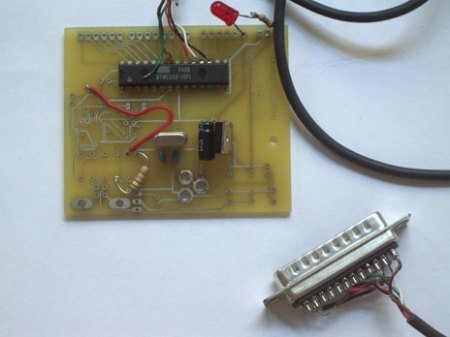If you ever wondered how the Arduino came into being, check out [IEEE Spectrum’s] article entitled “The Making of Arduino.” From it’s humble origins in Northern Italy, the Arduino, as shown by a large number of projects featured at [HAD], has become the go-to processor for DIY processing power. It’s cost (around $30) and ease-of-use are some of the biggest factors allowing it to become such a huge success.
One thing that interests many people about the Arduino is that it is totally open source, licensed under the Creative Commons License. This was quite innovative in itself since the CCL was generally applied to works of art like music and writing. Despite the fact that [Banzi] and his team decided to literally give the design away, 0ver 250,000 of these boards have been sold worldwide not including their many clones.
If you’re wondering how it got the name “Arduino”, it’s named after a bar named “Bar Di Re Arduino” in the Northern Italian town of Ivrea.

















Just to let you know, “Bar Di Re Arduino” means “The bar of the king Arduino” whoever he was.
I knew it sounded Italian.
Have you never seen an arduino in person? http://www.google.com/url?source=imglanding&ct=img&q=http://people.msoe.edu/~prust/EE1910/EE1910Resources/arduinoBottom.JPG&sa=X&ei=2H3CToTzMszLtgfXydHSDQ&ved=0CAwQ8wc&usg=AFQjCNFs0M2r5wMLSZ5SfYYgR8ENf1WY7A on the older board the map is way bigger.
Bar Di Re Arduino. Evidently this means something along the lines of “Bar of the Brave Kings Friend” I love it!
Arduino is a processor now? :S :P
Indeed, “Bar di Re Arduino” means “Bar of King Arduin”; he was the king of Italy around 1000 AC and was born, guess, in Ivrea :)
http://en.wikipedia.org/wiki/Arduin_of_Ivrea
IMO the only reason these have become popular is because of the standardization and the PC-arduino compatibility and ease of getting a “blink alive” program up and running. Anyone with some uC knowledge can easily do everything the Arduino does and more for less money on their own, but the key component is time. They’re great for quick prototyping because you don’t have to worry about hardware implementation like you do with a custom-built PCB or even a generic development board. The criticisms come into play when arduino becomes a crutch and someone uses it by default even in situations where it’s complete overkill or totally impractical. It’s a great tool for mechanical engineers or other people who don’t understand electronics entirely, or for electrical/computer engineers with a need for super quick prototyping.
I agree, I think you said it best with crutch. It is a neat board, but I as well as others can do what it does with a single mcu, and 1/10 the board space, for just $5.00
The Arduino comes with all the hardware you need to get basic things working, and also has a friendly software environment so you can do most things at higher layers (e.g. handling I/O on individual pins, and calling functions to set timers) instead of low layers (e.g. bit-twiddling the registers for a port to get the pin you want and bit-twiddling the interrupt registers to get the timer behaviour you want.) Sure, you’ll still want to buy a breadboard, some resistors, and some LEDs, but it’s everything you need to get started, and if you don’t even want to do that, get a Lilypad and some conductive thread bits.
Now that I’ve done that, if I want to build something with a smaller AVR chip, I know 90-99% of what I need to do that, and I’ll still use the Arduino for programming instead of buying dedicated programmer hardware. And I’ll start with the Arduino software environment, instead of writing raw bits, unless I need to do something down at that level because of chip limitations or performance.
By contrast, TI’s Launchpad is cool, but after I made the demo work, I needed to go find appropriate headers and solder them onto the board, and they insist on using a surface-mount component for the oscillator crystal instead of through-hole, so I’ll have to either learn SMD or risk burning stuff, and the software environment needs more lower-level bit-bashing and is much less beginner-friendly.
I make a correction.
The listens for the ardoino is not Crative comons but the GPL.
Spectrum article was originally titled something like “Arduino, so easy your mother could do it”. A few hours later they changed it and sent out a public apology email. Did anybody else see this in their email when it happened? I laughed(I agreed though, it was pretty sexist and childish).
Jack – the title was down to a comment Banzi made about even his mother being able to program, I’d agree though, that comment was rather sexist and childish.
Anyway lets not forget the more humble origins of the Arduino that is Wiring:
http://www.wiring.org.co
Wiring was the original simple MCU programming system, Banzi simply had the money and the contacts to get word out about his renamed version.
jop
https://arduinohistory.github.io/
shame on you IEEE…i expected better really i did.
In this article they refer to the Lilypad as waterproof… it’s definitely not…
Straight from the Lilypad web site:
“Washability
Wash at your own risk – we do ;). We recommend washing projects by hand with a mild detergent. Drip dry. Make sure you remove your power supply first!”
So technically it is, but you could still fry the chip
Heh! All this time I assumed the name had its roots in the Latin ‘ardua’ (as in “per ardua ad astra”) and was supposed to mean “little toil”. Made sense to me. Less work than using naked MCU platforms? (100x less register-bashing to make a peripheral work vs. MSP430, etc.) Or a labor of love maybe?